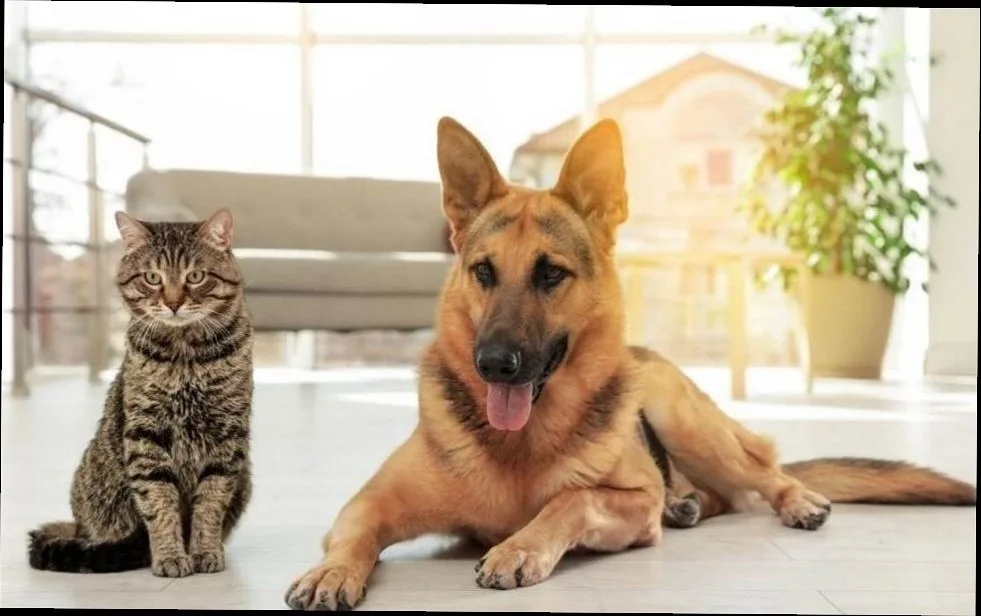
So, is it possible for German Shepherds to get along with cats? German Shepherds have a strong prey drive, which may prevent them from seeing your cat as a target to chase. However, if you properly socialize your German Shepherd as a puppy, he should have no problem getting along with your cats.
German Shepherds are smart enough to know who to trust and who to chase. But if you neglect to give them the training they need, they can quickly lose control and berate anything that moves in their vicinity.
Your Shepherd: Can cats and dogs get along?
It's a cliché as old as humanity itself. A rivalry that's been around longer than the animosity between the Dodgers and Giants (Go Dodgers!), a hatred that runs deeper than your neighbor's hatred of paying taxes.
Yes, I'm talking about cats and dogs. Enemies as old as time.
If anyone were to cross the aisle and mend the rift between humanity's two oldest friends, it would surely be the German Shepherd.
The German Shepherd may be big, but he is smart enough to know when to be gentle. Anyone who has had an adult German Shepherd in the same room as a human baby can attest to that. It's truly adorable.
But does this gentle behavior extend to our feline friends? **Can German Shepherds get along with cats?
German Shepherds are the most intelligent of dogs, but that doesn't make them any less capable of following their instincts. If German Shepherds are not properly socialized, they will chase a cat faster than you can say "squirrel.
But that doesn't mean German Shepherds can't learn to overcome their instincts.
If you properly socialize your German Shepherd from the time he is a puppy, he will get along wonderfully not only with cats, but also with other dogs, and even strangers.
But what does it mean to "socialize" a dog and how do you do it right?
This is where we will now turn our attention.
The cat-hunting instinct
Have you ever wondered why your German Shepherd loves to chase cats so much? The answer is simple, it's in their genes, my friend!
German Shepherds are working dogs and I bet you can guess where their specialties lie. Even today, shepherds all over the world employ German Shepherds to help them herd their flocks.
German shepherds roam the flock making sure no sheep are injured or in danger. They clip the ankles of any young lamb that dares to step out of line. It's a tough job, but they're damn good at it.
Many German shepherds may have left the rugged sheep-populated wilderness for a more suburban lifestyle, but that doesn't mean they've completely abandoned their instincts.
The urge to chase stuffed creatures and bite their ankles remains, and in the absence of sheep, your cat makes an adequate substitute.
But how can you teach your dog to ignore his powerful cat-stalking instincts? You want him to be a model citizen, but come on, even you have trouble not bothering your cat.
The answer lies in socializing with your dog.
For the most part, German shepherds can get along well with cats or other dogs. However, you should be careful when introducing your German shepherd to the new cat, as friction can occur sometimes.[1]
Socialize your dog to the cat.
Dogs are a lot like people. Some really enjoy meeting strangers, while others prefer to keep to themselves. All of them seem to love to jump on you just as you finish putting on your freshly dry-cleaned suit on the day of your big business presentation.
While some dogs seem to have a natural propensity to get along, all dogs can be trained to tolerate the presence of other animals and people.
This training is what breeders call "socialization".
Socializing your German Shepherd is fairly intuitive. Everyone is nervous around new people, including your German Shepherd. The more time you spend doing a new activity or getting to know someone, the less scary it becomes and you can relax. The same goes for your dog.
A German Shepherd that never goes outside will not be able to handle socializing with others very well. Just like children who are homeschooled never seem to fit in. (Sorry kids who were homeschooled.)
So, to effectively socialize your German Shepherd (and perhaps the same applies to homeschooled children!), you need to get him around other dogs, animals, and people to become familiar with them.
According to the American Kennel Club, German Shepherds are most open to learning and socializing in their first three months, so be sure to start early.
You can start by feeding your German Shepherd puppy and cat near each other. When you feed them, place your puppy on one side of a closed door and your kitten on the other side. If they see each other, they may get upset, but the proximity will help the animals get used to each other's smells.
Before you introduce your puppy to your kitten, make sure she knows and obeys three very important commands:
-
Sit
-
Stay on
These three commands should be sufficient for face-to-face interaction.
The first interaction between your puppy and your kitten should be brief and (hopefully) peaceful. Put your puppy in a kennel and place your cat in front of him. Let them interact for 5 to 10 minutes.
If your puppy shows any aggression, immediately tell him "no." If his aggression persists, take him to the kennel. If his aggression persists, immediately pick up the kitten and leave. By doing this, you are taking away a "good thing" from your dog. Your presence is the "good thing".
Continue these peaceful interactions for a few weeks, gradually increasing the interaction time until your pets can comfortably spend half an hour with each other.
When your puppy is ready, take him out of the kennel and let him interact with your cat on a leash. Repeat the process as if we were still in the kennel, immediately removing him from the cat if he shows aggressive behavior or doesn't follow commands.
Allow the two animals to interact until their interactions are peaceful, then repeat the process but off-leash. Be sure to keep a close eye on your dog.
German Shepherds can be very territorial, so it's a good idea to make sure he has his own space. Consider installing a cat flap on a closed door. The space behind the cat flap can be your cat's "territory" and the dog can have the rest of the space.
Keep in mind that your German Shepherd will grow to over 100 pounds. He can be a major threat to your poor kitten, even when he's just playing.
If your German Shepherd seems particularly rambunctious, send him to a puppy school to help him socialize. In addition to being a great way to effectively socialize your dog, puppy school can teach him basic commands and help him get used to the house.
Helpful Tips for German Shepherd Training
If you adopt a dog, ask a shelter worker if the dog was raised with cats. If so, it is much more likely to behave with yours.
Have your German Shepherd spayed or neutered before it reaches puberty, at about 6 months. This will greatly decrease the dominant behavior they show your kitten.
German Shepherds love to run around and do crazy things. Make sure your dog gets plenty of exercises and he will be less likely to bother your cat.
German Shepherds respond well to positive reinforcement with many dog treats. Don't be afraid to praise them when they behave well, or not reward them when they do something wrong.
Related Questions:
Do German shepherds get along well with children? A well-socialized German Shepherd gets along well with children, but there are always some exceptions. For some reason, toddlers have difficulty. A curious child is likely to give the dog a little bump on the nose, and even the best-behaved dog may have trouble resisting the retort.
Are German Shepherds good family dogs? German Shepherds are America's second-favorite dog and for good reason. These intelligent, loyal and beautiful dogs are full of tricks and laughter. They are well-behaved and have a playful attitude. German Shepherds are considered excellent family dogs for families with children of all ages.
[1] Do German Shepherds Get Along With Cats? (w/ Case Study)

